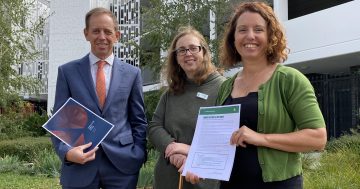
Housing and Suburban Development Minister Yvette Berry turns the first sod on a public housing project in Dickson. Photo: Supplied.
Public housing tenants refusing to be relocated as part of Housing ACT’s renewal program face sudden death hearings to decide whether they can be granted an exemption.
Despite Housing and Suburban Development Minister Yvette Berry portraying the hearings as informal and ongoing, it will be the end of the road for tenants if the government-appointed Tenant Relocation Exemption Panel rejects their applications.
The ACT Government fact sheet produced for tenants states that the panel, made up of representatives from community service organisations and Housing ACT, will consider exemptions. Applicants will be notified of an outcome in writing within 14 business days.
The decision will be final unless new information can be provided.
“If your application for exemption is not granted, you will be required to relocate under the Growing and Renewing Public Housing program. Your Tenant Relocation Officer will continue to work with you and your supports to find a suitable relocation property,” it says.
“The decision made by the panel is not appealable. An application for exemption will only be reconsidered if new information that has not previously been considered is received.”
The fact sheet comes with an exemption application form and a letter telling tenants that they need to apply to Housing ACT to avoid having to move.
The ACT Council of Social Services criticised the process and the limited 48 hours’ notice given to tenants that the hearings would start this week, only to have Ms Berry accuse ACTCOSS of causing unnecessary distress to tenants.
“These meetings are just an opportunity for tenants and any support people they’d like to bring to attend a meeting to discuss their needs and reasons for seeking an exemption to relocation to support their application if they wish to,” Ms Berry told Region.
But ACTCOSS CEO Dr Emma Campbell said that what the government said was happening appears to be quite different from the reality for tenants.
“Minister Berry has presented these meetings as informal and ongoing. Even if they were, 48 hours is insufficient to organise representation and support,” she said.
“The fact sheet that tenants have received shows that the hearing involves a formal panel where a decision is made as to whether these tenants can stay or go. It clearly states that the decision cannot be appealed.”
Dr Campbell said that some tenants appearing before the panel had either not received the fact sheet, an exemption application form and a letter or only received them late on Wednesday.
She said all ACTCOSS wanted was a fair process for tenants, some of whom had been in the same property for decades.
Hearings began on Thursday (16 June).
Housing ACT said that of 10 tenants contacted, three had requested a panel session at a later date, three were attending this week in person, one was attending by phone and three had asked not to attend a panel session in relation to their application for exemption.
Housing ACT said there would be multiple panel sessions, and tenants could choose a later date if they prefer.
All tenants were advised by phone and/or email that they could attend or nominate a representative to attend a panel in person or over the phone if they wished to.
To date, nine tenants have been given an exemption, 26 have refused to move, 101 have agreed to relocate and are waiting to move, and 350 have already moved. All up, 700 properties are involved so far.
According to the fact sheet, reasons for exemption could be health, age, safety and cultural appropriateness, and proximity to social supports and services.
But the panel will also look at whether another property could better suit a tenant’s needs, if the current property is underutilised, and the overall impact to the renewal program and Housing ACT’s ability to house those most in need.
Housing ACT wants to move tenants from selected properties so these can either be sold to pay for new projects or redevelop the sites, usually with multiple dwellings.
It announced the long-expected relocation program earlier in the year but came under fire for the way it went about telling tenants and a lack of consultation with the community sector.
The renewal program has a target of 1400 new dwellings by 2024-25.



















